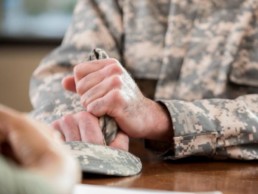Raising Awareness About Post Traumatic Stress
In WWI it was called Shell Shock; in WWII, Battle Fatigue. Korean War veterans were diagnosed with War Neurosis, and Vietnam vets with Post-Vietnam Syndrome. Whatever you call it, Post Traumatic Stress (PTS), as it’s now known, continues to affect hundreds of thousands of veterans.
Today is PTSD Awareness Day, a day to speak up about post-traumatic stress, a condition that’s underreported, misdiagnosed, and, so often, misunderstood.
PTS BY THE NUMBERS:
- 10-13% of combat veterans experience post-traumatic stress in their lifetimes.
- Studies estimate that 1 in 5 military personnel returning from Iraq and Afghanistan has PTS.
- PTS affects to 20% of Operation Enduring Freedom and Operation Iraqi Freedom veterans; 10% of Gulf War veterans, and 30% of Vietnam War veterans.
- 17% of combat troops are women; 71% of female military personnel develop PTS due to sexual assault within the ranks.
- The number of diagnosed cases of PTS in the military jumped 50% in the past year.
SEPARATING MYTH FROM FACT
The psychological scars of post-traumatic stress may be invisible, but its manifestations are not. Left untreated, it can lead to depression, drug and alcohol abuse, or suicide. Despite its prevalence, post-traumatic stress is often ignored, misinterpreted, and sensationalized by the media.
Listening to the stories of veteran experiencing post-traumatic stress can help us separate myth from fact.
MYTH: People begin experiencing PTS immediately after a traumatic event.
FACT: Sometimes symptoms surface months or years after a traumatic event or returning from deployment.
“ I was sober and clean almost 11 years, and I just couldn’t handle it no more, you know, my life. I couldn’t hold a job. I always had problems sleeping…very irritable, the whole bit. Plus, my family was always telling me I should go get some help.”
US Navy ((1971 – 1972))
SN, Ammunition Transporter
Vietnam
MYTH: Service members can never fully recover from PTS.
FACT: When people seek help and maintain a treatment program, post-traumatic stress symptoms can be managed or overcome entirely.
“My ability to overcome the situations that cause me to act negatively and not beneficial to me, are up to me, and I continue to seek treatment. I want to make a choice, not have my depression make the choice.”
Traumatic Brain Injury and the Importance of Connection
Often referred to as the signature injury of the Iraq and Afghanistan wars, the prevalence of traumatic brain injury (TBI) among veterans is higher than it’s ever been. The most common cause of TBI among Operation Enduring Freedom and Operation Iraqi Freedom service members is injuries suffered from Improvised Explosive Devices, or IEDs, used extensively against Coalition Forces.
Many people who sustain a Traumatic Brain Injury recover completely. However, in severe cases, a traumatic brain injury can cause emotional and behavioral changes that can be difficult to understand and accept.
A traumatic brain injury affects the entire family and often results in financial challenges, job loss and isolation. In the United States, 1.7 million people sustain a TBI each year. Whether you have suffered a TBI or are caring for someone who did, understanding you’re not alone is critical, the best thing you can do is reach out.
Join a group
Meeting in person with other people with similar experiences can be cathartic. There are several places to find groups in your area.
Meetup.com has many brain injury and veteran meet ups across the country.
The Brain Injury Association of America has local chapters and various support groups throughout the U.S.
Share your story
When you can share your story and hear the stories of others, you realize there are people out there who understand what you’re going through, who can commiserate, or help put things in perspective. Luckily, the internet makes sharing easier than ever.
Brainline Military is an organization that serves the military community providing information, resources, and support for current and former service members and their families living with traumatic brain injury. Read the personal stories of military members living with TBI, and share your own.
A quick search for “Facebook TBI support group” turns up a handful of pages where you can connect on Facebook and be part of the conversation.
Get Informed
Knowing about traumatic brain injury—the symptoms, treatment options, and benefits you’re eligible for as a veteran or active duty military—will allow you to thrive, not just survive with this condition.
Take a look at our list of TBI resources.


